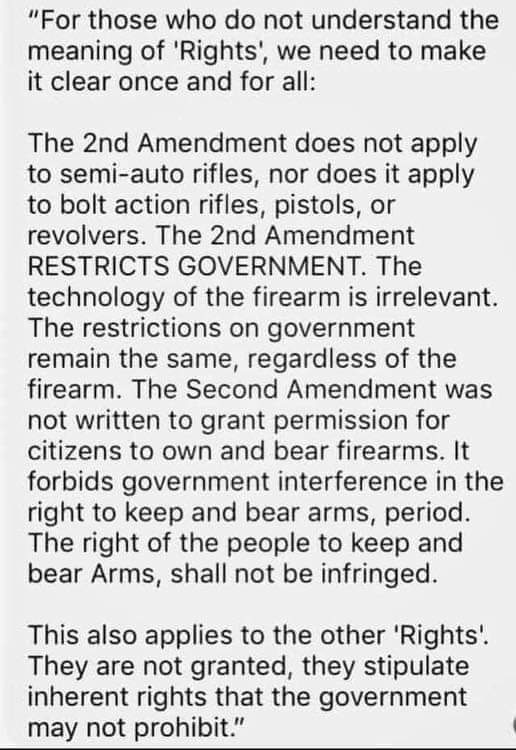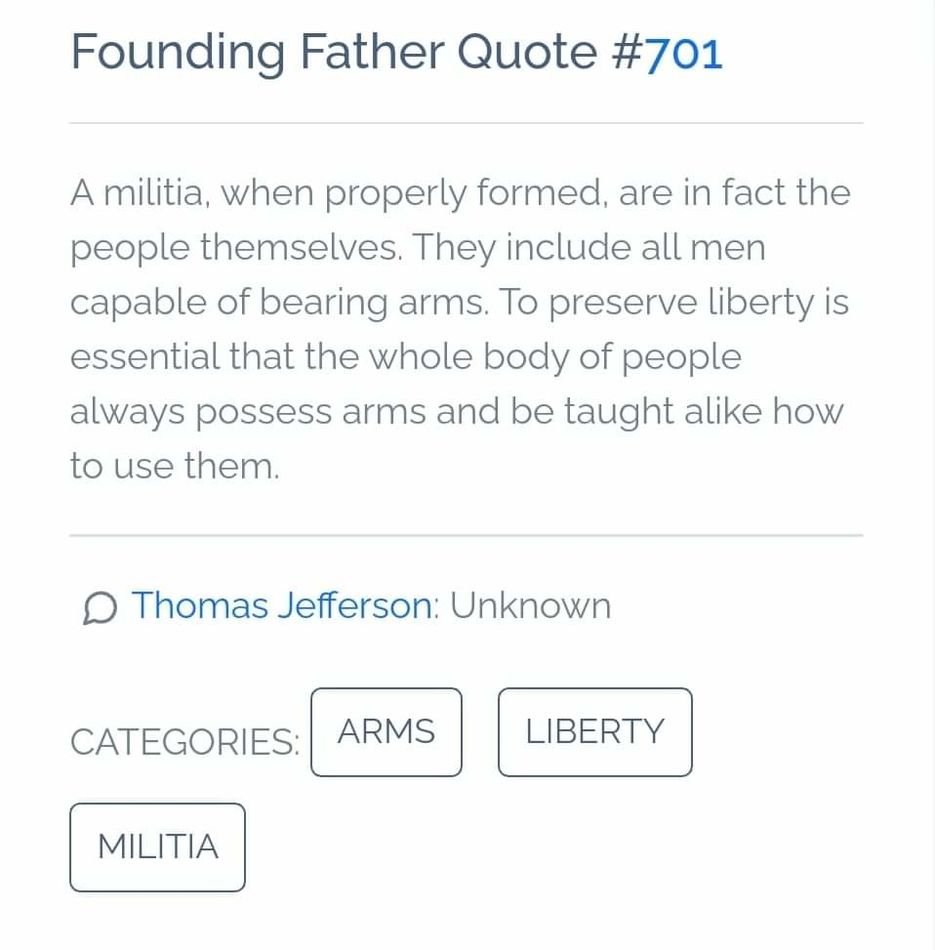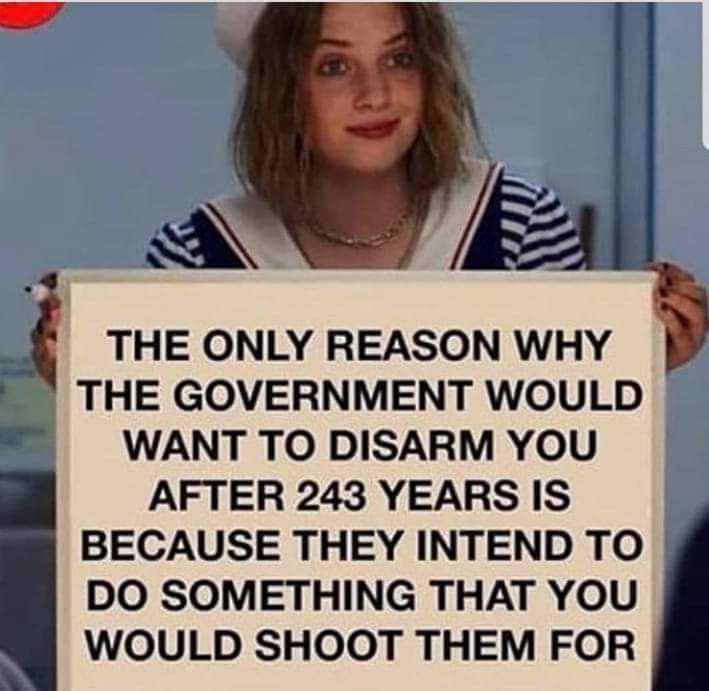D.C. Vs. Heller...Scalia's Majority Opinion
Jun 8, 2022 07:51:28 #
slatten49
Loc: Lake Whitney, Texas
From The National Review...By ED WHELAN, June 26, 2008
Here’s a quick (and, given its 64 pages, necessarily highly selective) summary of Justice Scalia’s opinion for a 5-member majority in District of Columbia v. Heller, invalidating D.C.’s handgun ban on Second Amendment grounds:
1. The Second Amendment protects an individual right to possess a firearm unconnected with service in a m*****a and to use that arm for traditionally lawful purposes, such as self-defense at home.
(a) In the Second Amendment’s operative clause (“the right of the people to keep and bear Arms, shall not be infringed”), the phrase “the right of the people” creates “a strong presumption that the Second Amendment right is exercised individually and belongs to all Americans.”
In the phrase “to keep and bear Arms”, the word “Arms” “extends, prima facie, to all instruments that constitute bearable arms, even those that were not in existence at the time of the founding.” The phrase “keep … Arms” means “have weapons.”. The phrase “bear Arms” means to “carry weapons” and was understood as part of “the natural right of defense ‘of one’s person or house”. It “in no way connotes participation in a structured military organization.” Justice Stevens’s claim that “bear Arms” “connotes the actual carrying of arms … but only in the service of an organized m*****a” incoherently gives “Arms” two different meanings at once:
It would be rather like saying “He filled and kicked the bucket” to mean “He filled the bucket and died.” Grotesque.
The operative clause thus guarantees “the individual right to possess and carry weapons in case of confrontation. This meaning is strongly confirmed by the historical background of the Second Amendment.”
(b) The relevant question for the prefatory clause (“A well regulated M*****a, being necessary to the security of a free State”) is whether it is consistent with our reading of the operative clause. The phrase “well regulated M*****a” means “all males physically capable of acting in concert for the common defense.” The phrase “security of a free state” meant “security of a free polity,” not security of each of the several States. This point would seem to defeat one of the strongest arguments against incorporating the Second Amendment against the States.
The prefatory clause “fits perfectly” with the operative clause, as the founding generation knew that “the way tyrants had eliminated a m*****a … was not by banning the m*****a but simply by taking away the people’s arms, enabling a select m*****a or standing army to suppress political opponents.” But the prefatory clause “does not suggest that preserving the m*****a was the only reason Americans valued the ancient right; most undoubtedly thought it even more important for self-defense and hunting.”
(c) Our interpretation is confirmed by analogous provisions in state constitutions, is not undercut by the drafting history of the Second Amendment, is consistent with how virtually all interpreters of the Second Amendment interpreted it in the century after its enactment, and is not foreclosed by any of our precedents, including United States v. Miller.
2. We don’t address whether (contrary to the 19th century ruling in United States v. Cruikshank) the Second Amendment should be deemed incorporated to apply against the States.
>>>>>>>>>>>>>>>>>>>>>>>>>>>>>>>>>>>>>>>>>>>>>>>>>>>>>>>>>>>>>>>>>>>>>
3. The Second Amendment right is not unlimited. We do not cast doubt on concealed-weapons prohibitions, laws barring possession of firearms by felons and the mentally ill, laws barring firearms in sensitive places like schools and government buildings, and laws imposing conditions on commercial sale of arms. Also, the sorts of weapons protected are the sorts of small arms that were lawfully possessed at home at the time of the Second Amendment’s ratification, not those most useful in military service today, so “M-16 rifles and the like” may be banned.
>>>>>>>>>>>>>>>>>>>>>>>>>>>>>>>>>>>>>>>>>>>>>>>>>>>>>>>>>>>>>>>>>>>>>
4. D.C.’s ban on handgun possession violates the Second Amendment. The “inherent right of self-defense has been central to the Second Amendment right. The handgun ban amounts to a prohibition of an entire class of ‘arms’ that is overwhelmingly chosen by American society for that lawful purpose. The prohibition extends, moreover, to the home, where the need for defense of self, family, and property is most acute.” The handgun is considered by the American people to be the “quintessential self-defense weapon.”
“Under any of the standards of scrutiny that we have applied to enumerated constitutional rights” (this doesn’t include rational-basis scrutiny, the D.C. ban falls.
D.C.’s requirement that lawfully owned firearms in the home, such as registered long arms, be “unloaded and disassembled or bound by a trigger lock or device” also violates the Second Amendment as it makes it impossible for citizens to use those firearms for the core lawful purpose of self-defense.
Here’s a quick (and, given its 64 pages, necessarily highly selective) summary of Justice Scalia’s opinion for a 5-member majority in District of Columbia v. Heller, invalidating D.C.’s handgun ban on Second Amendment grounds:
1. The Second Amendment protects an individual right to possess a firearm unconnected with service in a m*****a and to use that arm for traditionally lawful purposes, such as self-defense at home.
(a) In the Second Amendment’s operative clause (“the right of the people to keep and bear Arms, shall not be infringed”), the phrase “the right of the people” creates “a strong presumption that the Second Amendment right is exercised individually and belongs to all Americans.”
In the phrase “to keep and bear Arms”, the word “Arms” “extends, prima facie, to all instruments that constitute bearable arms, even those that were not in existence at the time of the founding.” The phrase “keep … Arms” means “have weapons.”. The phrase “bear Arms” means to “carry weapons” and was understood as part of “the natural right of defense ‘of one’s person or house”. It “in no way connotes participation in a structured military organization.” Justice Stevens’s claim that “bear Arms” “connotes the actual carrying of arms … but only in the service of an organized m*****a” incoherently gives “Arms” two different meanings at once:
It would be rather like saying “He filled and kicked the bucket” to mean “He filled the bucket and died.” Grotesque.
The operative clause thus guarantees “the individual right to possess and carry weapons in case of confrontation. This meaning is strongly confirmed by the historical background of the Second Amendment.”
(b) The relevant question for the prefatory clause (“A well regulated M*****a, being necessary to the security of a free State”) is whether it is consistent with our reading of the operative clause. The phrase “well regulated M*****a” means “all males physically capable of acting in concert for the common defense.” The phrase “security of a free state” meant “security of a free polity,” not security of each of the several States. This point would seem to defeat one of the strongest arguments against incorporating the Second Amendment against the States.
The prefatory clause “fits perfectly” with the operative clause, as the founding generation knew that “the way tyrants had eliminated a m*****a … was not by banning the m*****a but simply by taking away the people’s arms, enabling a select m*****a or standing army to suppress political opponents.” But the prefatory clause “does not suggest that preserving the m*****a was the only reason Americans valued the ancient right; most undoubtedly thought it even more important for self-defense and hunting.”
(c) Our interpretation is confirmed by analogous provisions in state constitutions, is not undercut by the drafting history of the Second Amendment, is consistent with how virtually all interpreters of the Second Amendment interpreted it in the century after its enactment, and is not foreclosed by any of our precedents, including United States v. Miller.
2. We don’t address whether (contrary to the 19th century ruling in United States v. Cruikshank) the Second Amendment should be deemed incorporated to apply against the States.
>>>>>>>>>>>>>>>>>>>>>>>>>>>>>>>>>>>>>>>>>>>>>>>>>>>>>>>>>>>>>>>>>>>>>
3. The Second Amendment right is not unlimited. We do not cast doubt on concealed-weapons prohibitions, laws barring possession of firearms by felons and the mentally ill, laws barring firearms in sensitive places like schools and government buildings, and laws imposing conditions on commercial sale of arms. Also, the sorts of weapons protected are the sorts of small arms that were lawfully possessed at home at the time of the Second Amendment’s ratification, not those most useful in military service today, so “M-16 rifles and the like” may be banned.
>>>>>>>>>>>>>>>>>>>>>>>>>>>>>>>>>>>>>>>>>>>>>>>>>>>>>>>>>>>>>>>>>>>>>
4. D.C.’s ban on handgun possession violates the Second Amendment. The “inherent right of self-defense has been central to the Second Amendment right. The handgun ban amounts to a prohibition of an entire class of ‘arms’ that is overwhelmingly chosen by American society for that lawful purpose. The prohibition extends, moreover, to the home, where the need for defense of self, family, and property is most acute.” The handgun is considered by the American people to be the “quintessential self-defense weapon.”
“Under any of the standards of scrutiny that we have applied to enumerated constitutional rights” (this doesn’t include rational-basis scrutiny, the D.C. ban falls.
D.C.’s requirement that lawfully owned firearms in the home, such as registered long arms, be “unloaded and disassembled or bound by a trigger lock or device” also violates the Second Amendment as it makes it impossible for citizens to use those firearms for the core lawful purpose of self-defense.
Jun 8, 2022 07:57:03 #
slatten49 wrote:
From The National Review...By ED WHELAN, June 26, ... (show quote)
so “M-16 rifles and the like” may be banned.
An automatic weapon - not a semi-automatic rifle such as the AR 15.
Jun 8, 2022 08:20:26 #
youngwilliam
Loc: Deep in the heart
American Vet wrote:
so “M-16 rifles and the like” may be banned.
An automatic weapon - not a semi-automatic rifle such as the AR 15.
An automatic weapon - not a semi-automatic rifle such as the AR 15.
Actually M-16's are not band. But you have to have a boat load of money and jump through the hoops, which can take months.
Jun 8, 2022 08:28:32 #
youngwilliam wrote:
Actually M-16's are not band. But you have to have a boat load of money and jump through the hoops, which can take months.
Yep
Jun 8, 2022 08:55:35 #
slatten49 wrote:
From The National Review...By ED WHELAN, June 26, ... (show quote)
Direct quote from the majority opinion of Cruikshank....
. The right to bear arms is not granted by the Constitution; neither is it in any manner dependent upon that instrument for its existence. The Second Amendments means no more than that it shall not be infringed by Congress, and has no other effect than to restrict the powers of the National Government.
https://supreme.justia.com/cases/federal/us/92/542/
United States v. Cruikshank, 92 U.S. 542, was a landmark decision of the US Supreme Court ruling that the Bill of Rights did not apply to private actors or to state governments despite the adoption of the Fourteenth Amendment. Wikipedia
Jun 8, 2022 08:57:24 #
Smedley_buzk**l wrote:
Direct quote from the majority opinion of Cruikshank....
. The right to bear arms is not granted by the Constitution; neither is it in any manner dependent upon that instrument for its existence. The Second Amendments means no more than that it shall not be infringed by Congress, and has no other effect than to restrict the powers of the National Government.
. The right to bear arms is not granted by the Constitution; neither is it in any manner dependent upon that instrument for its existence. The Second Amendments means no more than that it shall not be infringed by Congress, and has no other effect than to restrict the powers of the National Government.
Actually the entire Constitution is based on the premise of restricting governmental powers.
Jun 8, 2022 09:02:10 #
American Vet wrote:
Actually the entire Constitution is based on the premise of restricting governmental powers.
Goes to the 9th and 10th Amendments, those powers not specifically granted to the Feds are reserved to the states and people, including those not enumerated.
Jun 8, 2022 09:41:18 #
Smedley_buzk**l wrote:
Goes to the 9th and 10th Amendments, those powers not specifically granted to the Feds are reserved to the states and people, including those not enumerated.


Jun 9, 2022 11:44:37 #
coelacanth
Loc: Michigan swamp
Smedley_buzk**l wrote:
Direct quote from the majority opinion of Cruiksha... (show quote)



Jun 9, 2022 12:53:29 #
slatten49
Loc: Lake Whitney, Texas
American Vet wrote:
so “M-16 rifles and the like” may be banned.
An automatic weapon - not a semi-automatic rifle such as the AR 15.
An automatic weapon - not a semi-automatic rifle such as the AR 15.
True. For more definitive descriptions of the differences between the AR15 and the M-16...a variation of the same weapon:
https://theprepperinsider.com/ar-15/vs-m16/
If you want to reply, then register here. Registration is free and your account is created instantly, so you can post right away.
